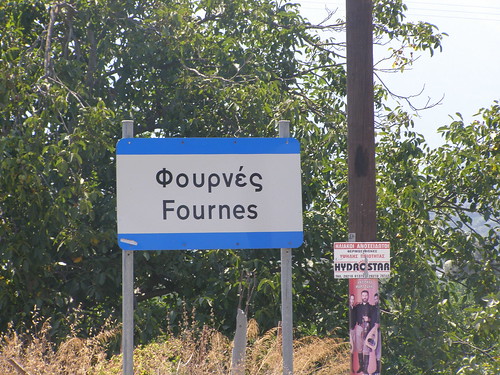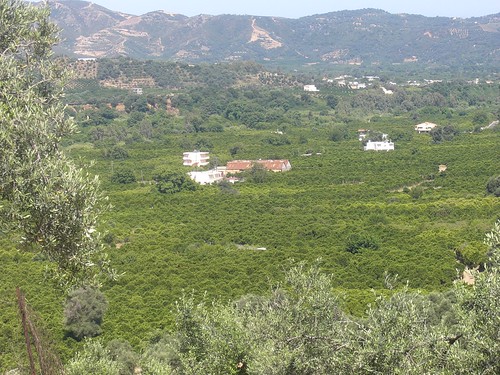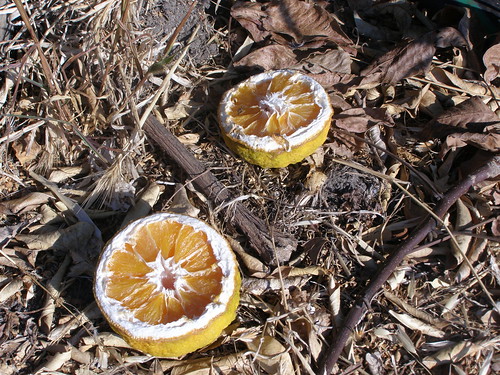It's ABC Wednesday again, and F is for Fournes, a village in north western Crete.
Fournes is the second-to-last village that you will meet on your way to the famous Samaria Gorge, the longest ravine in Europe (the last village is Lakki). It sits below the Lefka Ori mountain range. Its location, on a flat fertile plain just before the long and winding road leading to the mountains, was its greatest asset. The message one receives on passing it on their way to the Omalos valley where the gorge is located is that it has seen better days. The neo-classical designs in the old houses on the main road attest to a certain grandeur that has now become all but lost. The fields of Fournes are covered in olive and orange trees, but they often have a neglected look to them. They hint at a sign of modern times: the demise of agriculture.
The village was once considered very wealthy because its location was easily accessible, and agricultural produce was an important source of wealth. Back in the days of wealth and prosperity, people showed off their money by decorating their homes ornately, indulging in the latest fashion and dining out on a regular basis in the town. It is said that a man would get a new suit sewn every month, even if he didn't get a chance to wear the suit he had bought in the previous month. Those days are over. Olives are strewn uncollected under the trees, oranges remain on the tree even when it is producing new crops, wild thorny blackberry vines strangle olive and orange trees. The decay is obvious: rural decline in favour of urban progress.
Despite its drawbacks, Fournes still manages to lure locals and foreigners alike. The number of residents has grown slightly over the years since foreigners and wealthier citizens started building new houses in the area. This is all due to its proximity to the main town, and the plentiful agricultural occupations it offers. In the appropriate season, there is olive picking and orange packing, and if one is not averse to the sweaty toil of fieldwork, there are plenty of seasonal jobs available in the way of cleaning up fields by getting rid of thorny bushes and weeds under the trees, and generally maintaining the land, enticing in this way economic migrants. It is not a big deal to commute by car between town and village if your work is located in the urban centre (only the cost of petrol is a nuisance).
(Tomorrow I will present more photos from Fournes)



I had hoped to try for that gorge the last year - maybe next time?
ReplyDeleteRural decay happens here too. But most of the farmers are now renting more land to farm. So those who no longer feel a need to farm are setting back and letting someone else farm and then either get a rent check or a share of the crop when it is sold, or both.
ReplyDeleteI enjoyed reading your post.
What a contrast to our farming community, yet the farmers are toiling the same earth.
ReplyDeletethank you for the lovely tour of Fournes..
ReplyDeleteWhat a shame to see the Fruit decaying on the ground.
ReplyDeleteBear((( )))
Learned some more today - the gorge is particularly interesting.
ReplyDeleteHow sad that it is neglected. It seems a criminal waste. Lovely photos.
ReplyDeleteThe demise of agriculture is apalling - so sad to see such a beautiful and fertile spot neglected in this way.
ReplyDeleteVery informative post.
Gary
Bodge's Bulletin
Thanks for the interesting information. It's sad to see land neglected and fruit to be wasted.
ReplyDeleteThis is where we learn about so many things - the citydailyphotogroup, we dont learn all this in world geography in high school.
I'm looking forward to see more from Fournes.
Check out my 'F' for FLYOVER here
The oranges photo is so poignant and says a lot.
ReplyDeleteThis as been a great post foe ABC Wednesday and I enjoyed reading all the info... thank you.
ReplyDeleteVery interesting.
ReplyDeletewonderful post
ReplyDeleteI like villages and their natural beauty!
ReplyDeleteThat is a shame, but I imagine that farming that land is awfully hard work.
ReplyDeletegreat F post. the place looks lovely and you captured thier spots beautifully. great job.
ReplyDeleteWonderful information thanks - I fear you might be right about Tesco invading the demolished part of Hattersley - hope not.
ReplyDeletecool. :) i love how the lettering of the signage feels so exotic to me.
ReplyDelete1 have been working as a orange picker in this lovely village 24 years ago, it is unforgettable, beautiful people, beautiful surroundings, spring 2009 i will go back to see what time did to the village...
ReplyDelete